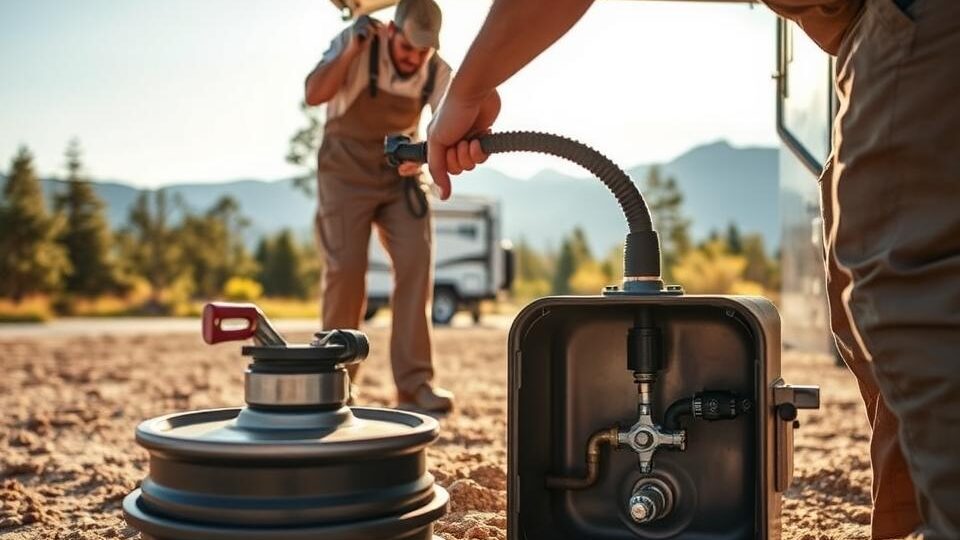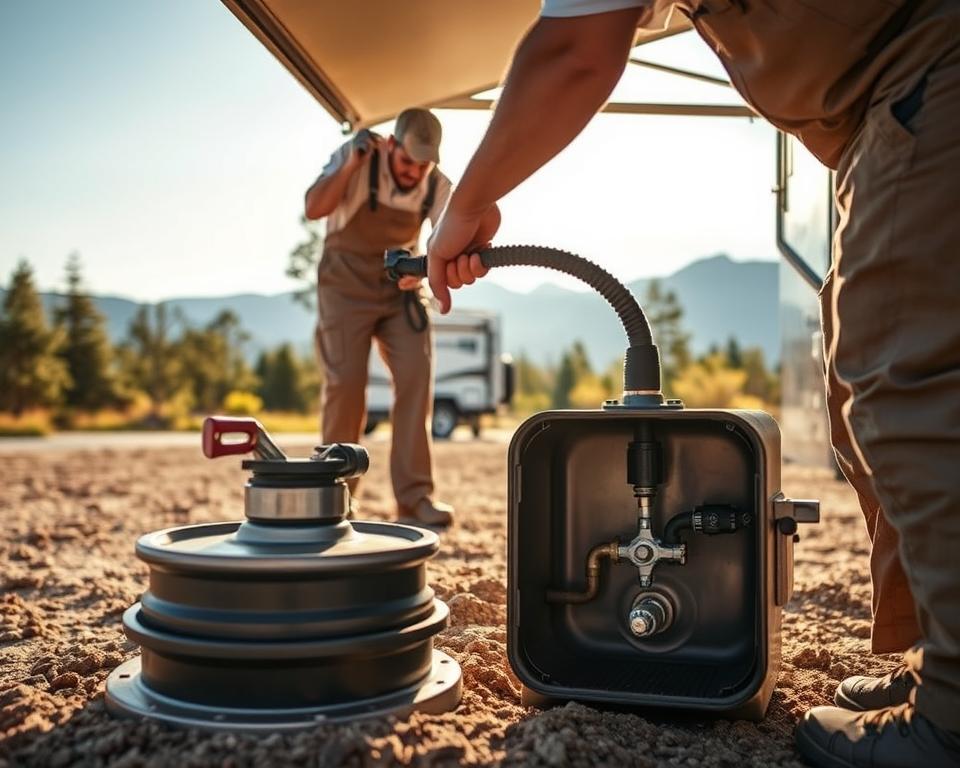
Troubleshooting Power Issues with Your Lone Pine RV Black Water Tank Pump
Septic Tank Pump Out: Essential Guide & Tips
Have you considered just where your waste goes after it leaves your sink or toilet? It’s managed by a carefully serviced septic system. Grasping the significance of septic tank clean-outs is essential for optimal waste management within your residence. Neglecting this can result in backups and costly fixes. The following guide is designed to reveal the necessity of septic maintenance and scheduled pump outs. By utilizing reputable septic services – RV water pump pressure tank, you shield your residence, natural surroundings, and promote your system’s extended lifespan.
Important Discoveries
- Regular septic tank pump out stops system failures and backups.
- Grasping your septic system aids in proper maintenance.
- Planning a pump out is vital for optimal waste management.
- Watch for signs that indicate your septic tank requires service.
- Selecting a competent service provider can enhance system efficiency.
- Booking septic tank cleaning services safeguards your home and the environment.
The Importance of Septic Tank Pump Out
Getting a septic tank pumping service periodically is critical for your system’s life span and performance. As years pass, your tank collects solid waste and organic debris, that may cause performance issues or even total system failure. Without septic system maintenance, you could face clogged pipes and ruined drain fields – problems that typically come with steep expenses and serious inconveniences to owners.
By getting professional septic tank services handle scheduled maintenance, you guarantee your system works well. This practice not only sidesteps pricey overhauls but also protects the soil and groundwater around your home from pollution. Scheduling regular pump outs, you foster environmental health and have a steadfast and efficient system for managing waste.
Septic System Basics
A standard septic system is pivotal in handling household wastewater. It’s composed of the septic tank, drainfield, and soil – parts that cooperate to effectively process waste. The septic tank offers a contained space for solid waste to dissolve biologically.
It’s crucial for homeowners to grasp how these parts work. Preserving the septic system in top shape is vital to its longevity and effectiveness. Through routine inspections and cleaning the septic tank when necessary, owners can avoid hefty breakdowns that could cause serious health and environmental issues.
Regularly maintaining your septic system secures your property and supports public health. Here, find a table showing the different septic system components and their functions:
| Component | Function |
|---|---|
| Septic Tank | Holds and digests solid waste through anaerobic bacteria. |
| Drainfield | Filters the treated effluent into the soil for further filtration. |
| Soil | Acts as a natural purifier to further treat wastewater. |
Knowing these elements shows the need for diligent septic system care. Proper operation depends on regular maintenance and cleanings by homeowners.
Pump-Out Frequency Guide
Understanding when to get your septic tank pumped is essential for its health. Typically, a septic pump out should occur every 3 to 5 years. However, a variety of factors might adjust this schedule.
The occupancy level in your home significantly impacts the pumping frequency. More inhabitants mean more wastewater, leading to more frequent maintenance. Moreover, habits like frequent washing or long showers might require quicker pump outs. Being proactive can greatly extend your septic system’s life.
It’s advisable to factor in specific elements, such as tank size and daily water use, to follow a proper schedule. Noting your last pump out date helps with timely planning for the next one, securing uninterrupted system performance.
Warning Signals for Pump Out
Homeowners should be vigilant for signs that suggest their septic tank needs pumping. Slow-draining sinks and toilets often point to an overfilled septic system, reducing the wastewater flow. Moreover, unpleasant smells around your home could indicate issues; they may emanate from the tank, signalling system failure.
Visible wastewater pooling in the yard is another significant indicator. If your lawn has soggy areas or unexplained puddles, it’s probable your septic system is overloaded. Ignoring these signs can develop into more serious issues that interrupt your home and become expensive to resolve.
To prevent serious complications, timely maintenance is vital. Engaging a professional service like All in Sanitation can be a smart move. They can properly diagnose and rectify these signs. This approach not only handles immediate issues but also maintains your system’s efficiency and health.

Selecting a Pump Out Provider
It’s crucial to pick a skilled septic tank pumping service to maintain your system running smoothly. Reputable companies understand the local regulations thoroughly, ensuring your septic system meets all requirements. A reliable service, like All in Sanitation, is dedicated to disposing of waste responsibly. This is important for the environment’s well-being.
In seeking the right septic service, think about these critical points:
- Experience and Reputation: Aim for companies with excellent feedback and long-standing success in your region.
- Licensing and Insurance: Confirm that your preferred provider holds the proper license and insurance to cover unexpected problems.
- Comprehensive Services: Prefer a service that includes inspections with pumping, spotting issues before they get worse.
Paying for a quality septic tank pumping service avoids big future repairs. Routine evaluations and steady upkeep ensure your system in prime shape. Making the right choice not only secures your investment but also supports a robust waste management system for your home.
Cleaning Your Septic Tank
For homeowners, septic tank cleaning is essential to ensure the system runs efficiently. During this process, removing sludge and scum is key to prevent blockages. A well-serviced system not only runs smoothly but also endures. Performing regular cleanings is vital for the health of your system.
Many homeowners request extra services to enhance septic tank care. These extras are important for removing harmful bacteria and stopping residue build-up. Understanding the necessity of proper maintenance can save you steep repairs. Remaining proactive in maintenance guarantees both environmental safety and household well-being.
Cost of Septic Tank Pumping Services
Homeowners must understand septic tank pumping costs for effective system maintenance. Prices range considerably due to region, tank size, and preferred service provider. Generally, this service costs between $200 and $600. It’s smart to collect bids from various companies, weighing both expertise and reliability.
Service providers like All in Sanitation provide affordable rates. Yet, the cost of septic tank cleaning reflects service quality and thoroughness. Homeowners should weigh these aspects carefully when choosing a service.
Evaluating quotes enables sound decisions that suit your budget and septic system needs. Grasping potential costs assists in financial planning for septic tank upkeep.
Septic System Maintenance Tips for Homeowners
Caring for your septic system well is vital. It ensures a durable and efficient setup. By following simple steps, the longevity of your septic tank increases, and saves money. Measures like cutting back on water consumption in your household play a critical role. Fixing leaks promptly and opting for water-saving appliances are smart steps.
It’s essential to refrain from flushing harmful substances down the drain. Chemicals, fats, or non-biodegradable items harm your septic system. For the wellbeing of your setup, dispose of such waste correctly. This approach preserves your septic tank’s natural processes.
Periodic inspections and the occasional pumping are mandatory for septic maintenance. Plan to have your system checked and serviced every three to five years. A maintenance schedule or checklist can be highly effective. It supports you in checking their system’s condition and sticking to maintenance guidelines.
Taking initiative with septic maintenance offers financial and environmental advantages. Through adopting these habits, homeowners enhance their septic systems’ efficiency and dependability. This commitment not only maintains your system but also promotes a healthier environment.
To Summarize
A septic tank pump out is crucial for septic tank upkeep, and residents need to take it with care. It wards off expensive repairs and increases the system’s lifespan, allowing for smooth operation for years to come. Understanding when to address system distress signals shields your property.
Choosing a trusted provider, like All in Sanitation, changes the game in septic tank care. Their expertise ensures proper service, promoting both environmental health and your home’s comfort. Forward-thinking upkeep protects your investment and encourages a greener planet.
Being knowledgeable about your septic system and its maintenance needs is key. Regular pump outs enhance home functionality and bolster public health. For any homeowner, understanding the value of septic tank care secures a efficient living environment for the future.